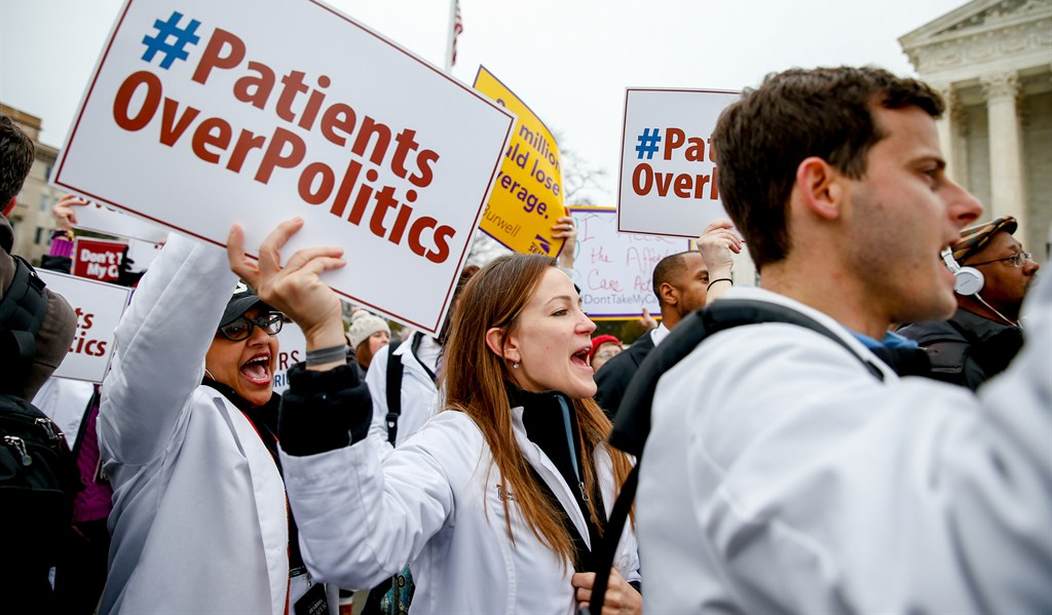According to Jonathan Gruber, an architect of ObamaCare who helped the Obama Administration deceive the American people about it, the law has three key interrelated components: (1) rules dictating what health insurance plans must include, (2) the individual and employer mandates, and (3) subsidies to states and individuals, premised on the assumption that all states would choose to create their own health insurance exchanges (marketplaces).
Each of these three components would need to remain in existence for the law to function as intended.
As such, ObamaCare is like a three-legged stool; if one leg is removed, ObamaCare will fall over (and should then be scrapped entirely due to its disastrous consequences).
In 2012, the U.S. Supreme Court addressed a challenge to the individual mandate, which requires most Americans to purchase health insurance or pay annual penalties.
When Congress passed the individual mandate, it made clear that it was enacting a requirement to buy insurance, backed by a regulatory penalty which was not a “tax.” Unfortunately, a majority of the Court effectively rewrote the law by holding that the individual mandate penalty was in fact a permissible tax.
Now pending before the Supreme Court is a challenge to ObamaCare’s subsidies, another leg of the ObamaCare stool.
The relevant statutory provisions make tax credits available to certain people based on their household income, but only if they purchase health insurance through exchanges that are established by the states, not by the federal government.
Under ObamaCare, subsidies are not available to residents of states that do not establish a health insurance exchange. (Federal law does not allow the purchase of health insurance over state lines.)
Whether a state chooses to create an exchange has significant consequences for the functionality of ObamaCare. Many individuals (such as the plaintiffs in the pending Supreme Court case) would be exempt from the individual mandate due to the unaffordability of coverage unless they become eligible for subsidies.
Recommended
Thus, declining to create a state exchange increases the number of residents who remain exempt from the individual mandate due to the lack of subsidy availability.
Also, the penalties for a regulated employer’s failure to provide an employee health plan only take effect if one or more full-time employees obtain insurance through a state exchange and receive a subsidy. Where there is no state exchange, however, there are no subsidies.
In the subsidy case pending at the Supreme Court, the American Center for Law & Justice (ACLJ) filed an amicus brief.
We explain that Jonathan Gruber acknowledged that the subsidy provision was intentionally limited to state exchanges. This was done to try to induce the states to set up their own exchanges because if they did not, their citizens would have to pay more for insurance on the federal exchange, where subsidies are unavailable.
Because Congress could not require states to create exchanges, based on principles of federalism, Gruber explained that Congress thought this financial inducement would put sufficient political pressure on the states to create the exchanges.
Gruber further explained that the federal government was intentionally slow in creating its own exchange to “squeeze the states” into setting up their exchanges.
Things, however, did not work out as the Obama Administration had hoped.
At present, two-thirds of the states do not have exchanges. Moreover, Hawaii, Maryland, Massachusetts, Nevada, New Mexico, Oregon, and Vermont originally set up state exchanges but later shut them down because they were financially unsustainable despite the considerable infusion of federal money.
In all, 34 states do not have state exchanges, and the federal government had to create its own exchanges in those states.
This created a problem for the Obama Administration. A large number of people would not get subsidies for purchasing insurance through the federal exchanges. People who already hated the law would hate it even more.
What was the response of the Obama Administration to this problem?
Despite the clear language adopted by Congress that tax credit subsidies are available only to those who purchase their health insurance through state exchanges, the Obama Administration, through its bureaucrats at the Internal Revenue Service, effectively rewrote the law to permit such subsidies for health insurance purchased on either state or federal exchanges.
The Obama Administration’s rewriting of ObamaCare violated the Constitution’s separation of powers. The Constitution does not allow the President to enact, amend, or repeal statutes. Congress, the legislative branch, debates and passes laws. As members of the executive branch, the President and his agencies put those laws into effect. This is U.S. Government 101.
If it would be better for ObamaCare’s subsidies to apply to insurance purchased through state or federal exchanges, then it is up to Congress to pass a new law (after a thorough, public debate) to fix that problem.
It is not the role of the executive branch to rewrite statutes as a matter of convenience if a law does not work as the President desires in practice.
The Supreme Court is expected to issue its decision in the subsidy case by the end of this month.
The Court should, based on the plain language of ObamaCare, rule that subsidies are only available to those who purchase insurance through state exchanges and that the Obama Administration violated the separation of powers by modifying the law.
If the Court so rules, ObamaCare’s already harmful consequences would become disastrous with the removal of one of its key components. In keeping with the design of our Constitutional Republic, any “fixing” of the law would be up to Congress.
Rather than trying to fix an unfixable law, however, Congress should repeal ObamaCare, which would be a popular thing to do since ObamaCare remains unpopular with a majority of Americans.

























Join the conversation as a VIP Member